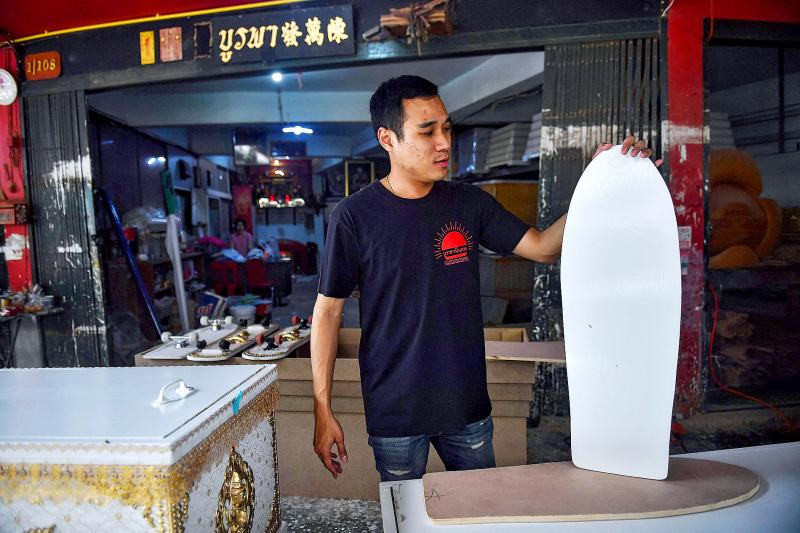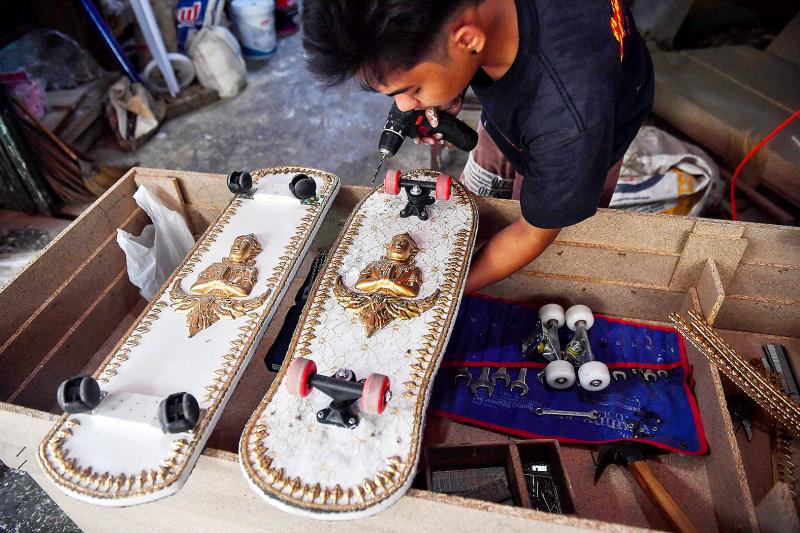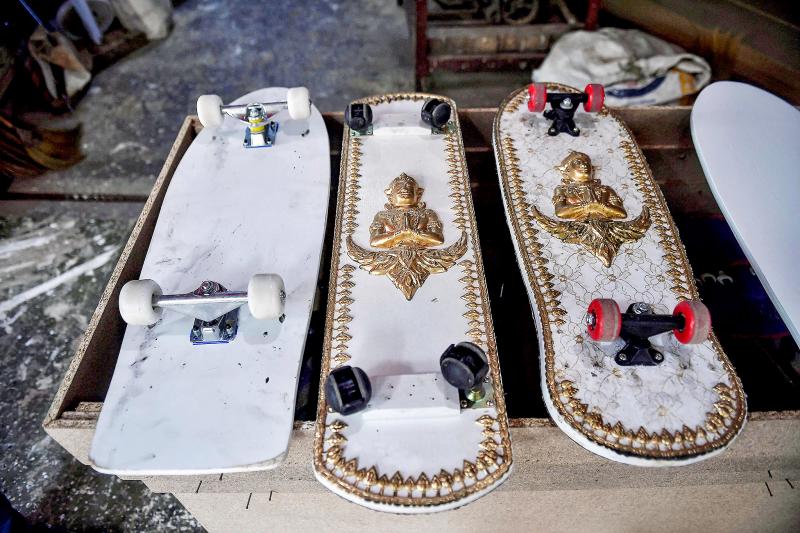From a final resting place for the dead to a gnarly way to land a trick; a Thai coffin-maker is affixing Buddhist emblems to the dismantled walls of his caskets, and transforming them into skateboards.
As the popularity of board sports exploded in Thailand, and the price of a skateboard skyrocketed, Anusorn Yungyearn decided to breathe new life into some of the wooden caskets he had lying around his Bangkok workshop.
“I want to give the kids who don’t really have much chance in life an opportunity to skate,” said the 30-year-old.

Photo: AFP
“I also don’t want them to ask their parents to buy one for them since the cost of it is really high.”
In the past year hordes of young Thais have taken up skateboarding and surf-skating — likely a consequence of most social spaces like bars and gyms being closed for months at a time because of pandemic restrictions.
Today, bands of young skaters can be seen cruising through Bangkok’s historic quarter and its universities’ open spaces.

Photo: AFP
Anusorn’s warehouse has coffins with brocade designs, golden lattice work and even holographic stick-ons. But for his boards, he has decided to keep it comparatively simple — gleaming white with golden trimming on the bottom.
“The procedure of making these boards is almost exactly like making the coffins,” he said, adding that he sticks a signature twist to the boards.
“We put the Thai angel emblem and the Thai traditional border on the board’s edge.” The first 10 he flips from coffins to skateboards will be donated to lower-income families — though he admitted getting them right will be tough.

Photo: AFP
“Some kids have never ever heard of a skateboard before so we want to make these casket skateboards as close to the real boards as possible.
“That way they could play and smile a little bit from all the fun.”

Jacques Poissant’s suffering stopped the day he asked his daughter if it would be “cowardly to ask to be helped to die.” The retired Canadian insurance adviser was 93, and “was wasting away” after a long battle with prostate cancer. “He no longer had any zest for life,” Josee Poissant said. Last year her mother made the same choice at 96 when she realized she would not be getting out of hospital. She died surrounded by her children and their partners listening to the music she loved. “She was at peace. She sang until she went to sleep.” Josee Poissant remembers it as a beautiful

For many centuries from the medieval to the early modern era, the island port of Hirado on the northwestern tip of Kyushu in Japan was the epicenter of piracy in East Asia. From bases in Hirado the notorious wokou (倭寇) terrorized Korea and China. They raided coastal towns, carrying off people into slavery and looting everything from grain to porcelain to bells in Buddhist temples. Kyushu itself operated a thriving trade with China in sulfur, a necessary ingredient of the gunpowder that powered militaries from Europe to Japan. Over time Hirado developed into a full service stop for pirates. Booty could

Lori Sepich smoked for years and sometimes skipped taking her blood pressure medicine. But she never thought she’d have a heart attack. The possibility “just wasn’t registering with me,” said the 64-year-old from Memphis, Tennessee, who suffered two of them 13 years apart. She’s far from alone. More than 60 million women in the US live with cardiovascular disease, which includes heart disease as well as stroke, heart failure and atrial fibrillation. And despite the myth that heart attacks mostly strike men, women are vulnerable too. Overall in the US, 1 in 5 women dies of cardiovascular disease each year, 37,000 of them

Politically charged thriller One Battle After Another won six prizes, including best picture, at the British Academy Film Awards on Sunday, building momentum ahead of Hollywood’s Academy Awards next month. Blues-steeped vampire epic Sinners and gothic horror story Frankenstein won three awards each, while Shakespearean family tragedy Hamnet won two including best British film. One Battle After Another, Paul Thomas Anderson’s explosive film about a group of revolutionaries in chaotic conflict with the state, won awards for directing, adapted screenplay, cinematography and editing, as well as for Sean Penn’s supporting performance as an obsessed military officer. “This is very overwhelming and wonderful,” Anderson